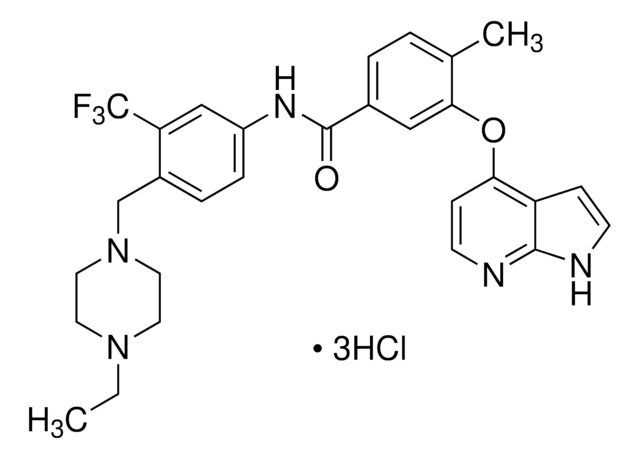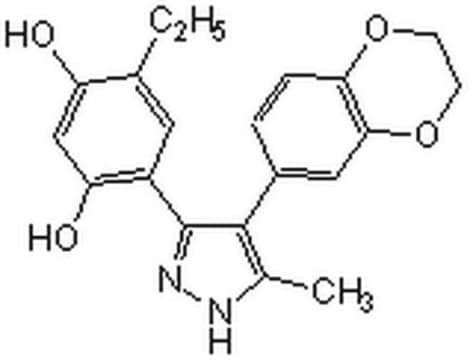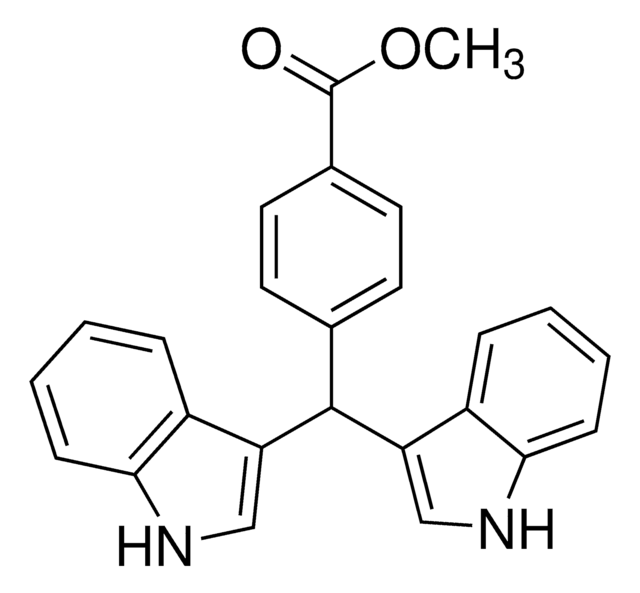SML2216
Takinib
≥98% (HPLC)
Sinónimos:
N1-(1-Propyl-1H-benzimidazol-2-yl)-1,3-benzenedicarboxamide
Iniciar sesiónpara Ver la Fijación de precios por contrato y de la organización
About This Item
Fórmula empírica (notación de Hill):
C18H18N4O2
Número de CAS:
Peso molecular:
322.36
UNSPSC Code:
12352200
NACRES:
NA.77
Productos recomendados
assay
≥98% (HPLC)
form
powder
color
white to beige
solubility
DMSO: 2 mg/mL, clear
storage temp.
2-8°C
SMILES string
CCCN1C2=CC=CC=C2N/C1=N\C(C3=CC(C(N)=O)=CC=C3)=O
General description
Takinib belongs to the aminobenzimidazole class of inhibitors.
Application
Takinib has been used as an inhibitor of transforming 28 growth factor - β-activated kinase -1 (TAK-1) in human leukemia monocytic THP-1 cells. It may be used as a TAK1 inhibitor in Jurkat cells.
Biochem/physiol Actions
Takinib is a selective inhibitor of TAK1/MAP3K7 kinase, which is a member of the MAP3K family and a key regulator of cell death. It binds in the TAk1 ATPbinding pocket with an IC50 value of 9.5 nM. Takinib selectively induced apoptosis following TNF-α stimulation in rheumatoid arthritis and breast cancer.
Storage Class
11 - Combustible Solids
wgk_germany
WGK 3
flash_point_f
Not applicable
flash_point_c
Not applicable
Certificados de análisis (COA)
Busque Certificados de análisis (COA) introduciendo el número de lote del producto. Los números de lote se encuentran en la etiqueta del producto después de las palabras «Lot» o «Batch»
¿Ya tiene este producto?
Encuentre la documentación para los productos que ha comprado recientemente en la Biblioteca de documentos.
Juliane Totzke et al.
Cell chemical biology, 24(8), 1029-1039 (2017-08-19)
Tumor necrosis factor alpha (TNF-α) has both positive and negative roles in human disease. In certain cancers, TNF-α is infused locally to promote tumor regression, but dose-limiting inflammatory effects limit broader utility. In autoimmune disease, anti-TNF-α antibodies control inflammation in
Jose A Guerrero-Martínez et al.
Nature communications, 11(1), 6196-6196 (2020-12-05)
The Transforming Growth Factor-β (TGFβ) signaling pathway controls transcription by regulating enhancer activity. How TGFβ-regulated enhancers are selected and what chromatin changes are associated with TGFβ-dependent enhancers regulation are still unclear. Here we report that TGFβ treatment triggers fast and
Constanza E Espada et al.
Journal of virology, 95(3) (2020-11-13)
Sterile alpha motif and HD domain-containing protein 1 (SAMHD1) restricts HIV-1 replication by limiting the intracellular deoxynucleoside triphosphate (dNTP) pool. SAMHD1 also suppresses the activation of NF-κB in response to viral infections and inflammatory stimuli. However, the mechanisms by which
Or Kalchiem-Dekel et al.
American journal of respiratory cell and molecular biology, 63(2), 185-197 (2020-04-28)
The primary function of APOE (apolipoprotein E) is to mediate the transport of cholesterol- and lipid-containing lipoprotein particles into cells by receptor-mediated endocytosis. APOE also has pro- and antiinflammatory effects, which are both context and concentration dependent. For example, Apoe-/-
Carolina Alves Nicolau et al.
Cellular immunology, 353, 104115-104115 (2020-05-11)
The CARMA1-BCL10-MALT1 (CBM) complex couples antigen receptors to the activation of Nuclear Factor κB (NF-κB) transcription factors in T/B lymphocytes. Within this signalosome, the MALT1 paracaspase serves dual roles: it is a crucial adaptor for signal transduction to NF-κB signaling
Nuestro equipo de científicos tiene experiencia en todas las áreas de investigación: Ciencias de la vida, Ciencia de los materiales, Síntesis química, Cromatografía, Analítica y muchas otras.
Póngase en contacto con el Servicio técnico








